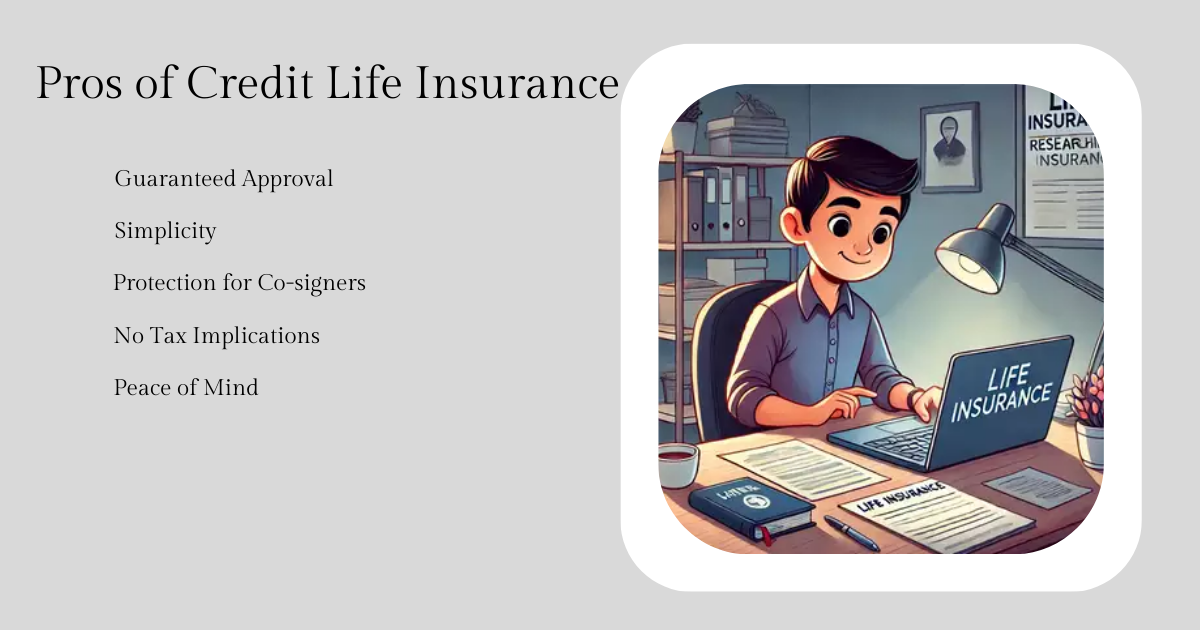Credit life insurance is a specialized type of policy designed to pay off a borrower’s outstanding debts in the event of their death. This insurance can provide peace of mind, ensuring that loved ones are not burdened with financial obligations. However, like any financial product, it comes with its own set of advantages and disadvantages. This article will explore the pros and cons of credit life insurance, helping you make an informed decision.
Understanding Credit Life Insurance
Credit life insurance is often offered when taking out significant loans, such as mortgages or car loans. The primary function of this insurance is to pay off the loan balance if the borrower dies before the debt is fully repaid. This type of insurance typically features a decreasing death benefit that aligns with the outstanding loan amount, meaning as you pay down your debt, the coverage decreases as well.
Pros of Credit Life Insurance

- Guaranteed Approval: One of the most significant advantages of credit life insurance is that it typically does not require a medical exam for approval. This makes it accessible to individuals who may have pre-existing health conditions or who are older, where traditional life insurance might be cost-prohibitive.
- Simplicity: Credit life insurance policies are straightforward and easy to understand. The coverage is directly tied to a specific loan, which means that beneficiaries do not have to deal with complicated claims processes when it comes time to settle debts.
- Protection for Co-signers: If you have a co-signer on a loan, credit life insurance can protect them from having to make payments on the loan after your death. This provides an added layer of security for those who may be financially impacted by your passing.
- No Tax Implications: The death benefit from credit life insurance is paid directly to the lender, which means there are no estate taxes incurred on this benefit. This can simplify financial matters for your beneficiaries.
- Peace of Mind: Knowing that your debts will be settled in the event of your death can provide peace of mind for both you and your loved ones. This assurance can be particularly comforting for those with significant financial obligations.
Cons of Credit Life Insurance
- Higher Premiums: Credit life insurance tends to be more expensive than traditional life insurance policies due to its guaranteed issue nature and the associated risk for insurers. Premiums are often folded into monthly loan payments, making them less visible but more costly over time.
- Decreasing Coverage: As mentioned earlier, the coverage amount decreases as you pay off your loan. This means that while you may be paying the same premium throughout the loan term, the actual benefit decreases over time, potentially leading to inadequate coverage if you pass away later in the loan term.
- Limited Flexibility: Unlike traditional life insurance policies that provide a lump sum payment to beneficiaries, credit life insurance restricts the payout to settling the specific debt. This limits financial flexibility for your loved ones, who may need funds for living expenses or other obligations .
- Not Always Necessary: For individuals who already have sufficient term life insurance or manageable debts, credit life insurance may not be necessary. It’s essential to evaluate your overall financial situation and existing coverage options before committing to this type of policy.
- Potentially Misleading Marketing: Some lenders may market credit life insurance aggressively, leading borrowers to believe it is essential for their loans when it is not legally required. This can result in unnecessary additional costs.
Making an Informed Decision
When considering whether credit life insurance is right for you, it’s crucial to weigh these pros and cons against your unique financial situation and goals. Here are some factors to consider:
- Existing Debt Obligations: If you have substantial loans or debts that would burden your family if left unpaid, credit life insurance could be a worthwhile investment.
- Current Insurance Coverage: Assess whether your existing term life insurance adequately covers your debts.
- Health Status: If you have health issues that make obtaining traditional life insurance difficult, credit life insurance might be a viable alternative.
- Financial Dependents: Consider whether your dependents would struggle financially without your income or if they would benefit from a lump sum payout instead.
Also Read : How To Save On Mortgage Insurance: Tips And Tricks
Conclusion
Credit life insurance serves a specific purpose in providing financial security against outstanding debts in case of untimely death. While it offers certain advantages such as guaranteed approval and simplicity, it also comes with drawbacks like higher premiums and limited flexibility in how benefits can be used.Ultimately, whether or not to purchase credit life insurance should depend on individual circumstances—particularly existing debts and overall financial goals. It’s advisable to consult with a financial advisor or an insurance expert before making this important decision.
FAQs
- What is credit life insurance?
Credit life insurance is a policy designed to pay off outstanding debts if the borrower dies before repaying them. - Is credit life insurance necessary?
It depends on individual circumstances; those with significant debts may find it beneficial while others might not need it if they have sufficient term life coverage. - Can I get credit life insurance without a medical exam?
Yes, one of its advantages is that it typically does not require a medical exam for approval. - How does credit life insurance differ from term life insurance?
Credit life specifically pays off loans upon death while term life provides broader coverage and flexibility for various needs. - Are there tax implications with credit life insurance?
No, since benefits are paid directly to lenders, there are no estate taxes incurred on these payouts.

